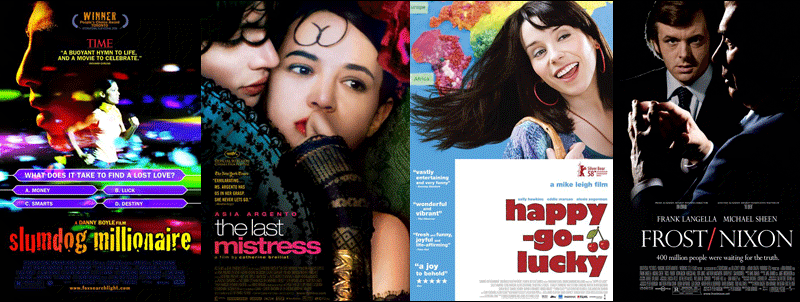“Australia”-Baz Luhrmann, whose last film was “Moulin Rouge,” seems to love BIG movies about love, and with a country like Australia and a place like the Northern Territory just prior to WW II, he has the perfect cinematic location for this melodramatic romantic tale. The cinematography is breathtaking, often encompassing stunning vistas of desert land that makes one wonder why it was a good location for raising cattle. Nicole Kidman is Lady Sarah Ashley, a British woman who comes to Darwin in 1939 to find out what her husband has been up to on their cattle ranch which is surrounded by land owned by cattle baron King Carney (Bryan Brown) who covets the Ashley land. But Sarah discovers her husband has been murdered and that one of her husband’s employees, Neil Fletcher (David Wenham), has fathered a young boy, Nullah (Brandon Walters), with an aboriginal woman and treats Nullah and other aboriginals with disdain and cruelty. When Sarah fires the obviously evil Fletcher, she hires Drover (he has no other name in the film) (Hugh Jackman) to drive her cattle through the “Never Never,” a rather barren land, to Darwin in order to beat Carney to the punch in selling the cattle to the army. The cattle drive is reminiscent of many American western films about battles between good ranchers and evil cattle barons, but those films never wound up with scenes of Japanese Zeros attacking a port town like Darwin. The main theme of this epic concerns the Australian policy, in those miserable years, of taking aboriginal children from their mothers and placing them in institutions (an issue dealt with in the excellent film “Rabbit-Proof Fence” of a few years back) and Nullah’s attempts to remain invisible from the local police are at the heart of this film which ultimately develops into a romance between Sarah, known as “Mrs. Boss” to the locals, and Drover, a man who doesn’t want to be anyone’s “employee” and their attachment to Nullah. Nicole Kidman and Hugh Jackman do a fine job, in somewhat corny roles, as two people from different worlds drawn together by circumstances. Kidman looks gorgeous and Jackman, not surprisingly, is a stud. But the real star of this film is Brandon Walters, a young aboriginal boy, whose smile can light up a room and who is absolutely alive as the charming Nullah who, aside from wanting to stay with his ultimately ill-fated mother, desires to go on a walkabout (an aboriginal tradition) with his grandfather, King George (David Gulpilil), if he can survive Australian racism and Japanese bombs. As he did in “Moulin Rouge,” Baz Luhrmann goes overboard. In that film, it was a little too much fantasy. In this film, it’s length. “Australia” goes on for 2 hours and 45 minutes. A really good editing job could have tightened the story and removed many extraneous scenes. Also, and I guess it couldn’t have been helped considering the theme, the film ends with about as corny a scene as one can imagine in the circumstances. But ultimately, especially viewed in Blu-ray, “Australia,” Baz Luhrmann’s homage to his homeland, is quite a sight to see. B+ (3/28/09) | |




